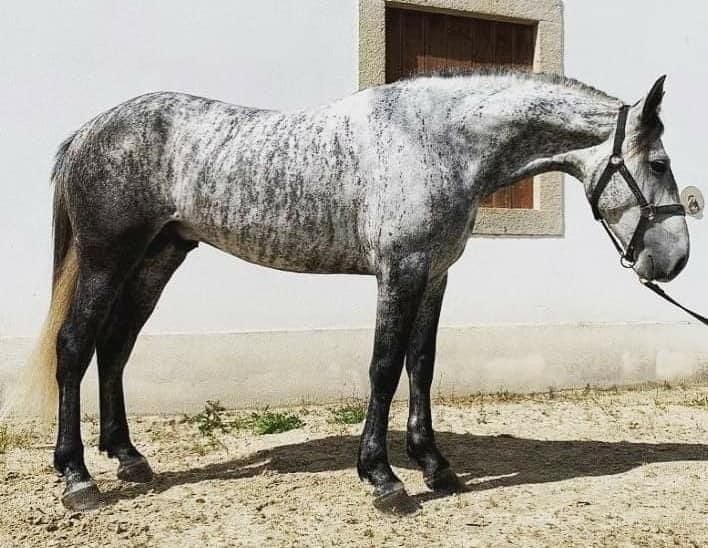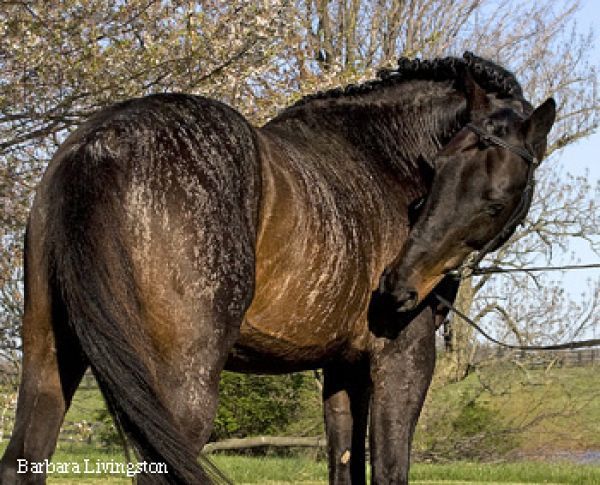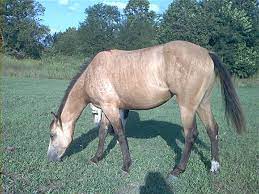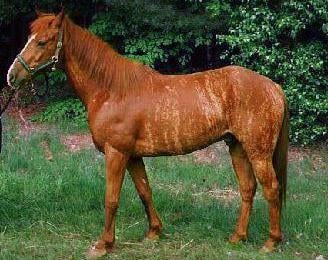The Brindle Horse Phenomenon
You may have seen a brindle pattern on an animal and not even known it. While brindle horses are a rare occurrence (in fact - brindle is the rarest horse color!), this pattern is actually pretty commonly seen in both cattle and dogs. It’s a common misconception in the horse community that there are a lot of brindle horses out there, but that’s just not the case. The typical reason for this mistake is that the brindle horse color is often mistaken for dun markings on a horse.
What Exactly is the Brindle Horse Color?
A brindle horse is not a breed of horse, rather, it is a coloring pattern that sometimes appears on horses. Brindle markings can also (and more commonly) show up on other animals, such as:
-
Cows
-
Dogs
-
Guinea Pigs
-
Cats
The brindle horse color is characterized by partial striping on the horse. In most cases, it looks like water has been dripping down the coat of the horse. The stripes/drip marks on the horse coat can be any color, but it’s most common that the brindle pattern is darker than the base coat color.
What Causes Horse Brindle?
A big question that comes up when seeing a brindle pattern on a horse is: what causes it? Unfortunately, the answer is that we don’t know. Researchers believe that the brindle horse pattern appears due to a genetic mutation.
Horses that have the brindle pattern will have a unique gene composition that has to do with the BR1 (brindle) allele. However, just because your horse does not show brindle on their coat, that does not mean that they do not carry the chromosomal variation, and could possibly pass it onto their offspring.
If you’re interested in possibly breeding a brindle horse and you would like to get your horse tested to see if they are a carrier of this allele, you can reach out to UC Davis Veterinary Genetics Laboratory.
Brindle Horse Breeds
Although a brindle horse is a rare sighting, they can appear across a wide variety of horse breeds.
The most common brindle horse breeds are Quarter Horses and Paint Horses. However, brindle coloring can also show up in other breeds including (but not limited to) Arabians, Thoroughbreds, Mustangs, Tennessee Walking Horses, Bavarian Warmbloods, German Warmbloods, Spanish Horses, Mules, and Donkeys.
What Color are Brindle Horses?
Since brindle is a pattern on the coat and not a color, brindle horses can be any color. The most common color of brindle horse markings appear in light brown to black shades. However, they can appear in almost any combination of colors. Fun fact: the colors of a brindle horse can also change from season to season!
Let’s take a look at some pictures of different color variations of brindle horses:
Gray Brindle Horse
Bay Brindle Horse
Buckskin Brindle Horse
Learn more: Everything You Need to Know About Buckskin Horses
Chestnut Brindle Horse
Is Brindle Harmful to a Horse?
Although the brindle pattern is caused by a genetic abnormality, there is no negative effect on a horse if they have brindle markings on their coat. It simply makes them more unique in appearance. As a result of this, brindle horses can often come with higher price tags as opposed to other horses.
However, it should be noted that it is NOT recommended to buy a horse based on coloring alone. Even though the brindle horse color is certainly eye-catching, when buying a horse, there are more important factors that should be considered such as breed and discipline. You should narrow down specifically what you are looking for in a horse, and then you can look around to see if you can find a brindle horse within those constraints.
Read more: Horse Ownership for Beginners: The Ultimate Guide for Beginner Horse Owners
What Should I Name My Brindle Horse?
When it comes to brindle horse names, you can really have a lot of fun! Because of the rarity of these horses as well as their extremely distinct appearance, the options are limitless. Some of the most common name ideas for brindle horses include:
-
Rarity
-
Splash
-
Wispy
-
Oddity
-
Cobblestone
-
Splatter
-
Galaxy
-
Hot Spot
-
Spots
-
Dot
-
Rain
Owning a Brindle Horse
Brindle horses are certainly one-of-a-kind, but they don’t require any type of special care when it comes to owning one. The overall amount of maintenance that your horse will require will vary greatly from horse to horse. This is also largely dependent on several factors such as the breed of your horse, their age, their training, and any health conditions that they may have. Owning a brindle horse is just a little bit more special because they have such a distinctive look to them.
Frequently Asked Questions
Does the brindle color get darker with age?
Brindle coloring can change from season to season and can gradually darken over time as well.
What causes brindle in a horse?
A genetic mutation known as the BR1 allele causes brindle in a horses coat.
What is reverse brindle?
In standard brindle, the brindle pattern is darker than the coat. However, in reverse brindle, the coat will be darker than the brindle markings.





